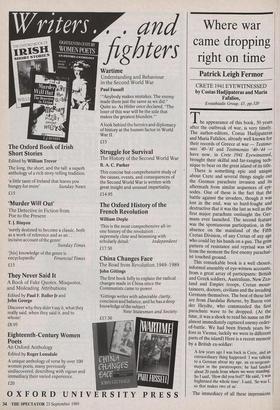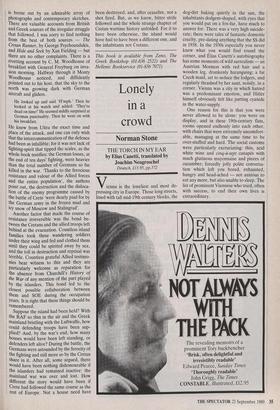Where war came dropping right on time
Patrick Leigh Fermor
CRETE 1941 EYEWITNESSED by Costas Hadjipateras and Maria Fafalios, Evstathiadis Group, £5, pp.320 The appearance of this book, 50 years after the outbreak of war, is very timely. The author-editors, Costas Hadjipateras and Maria Fafalios, already well known for their records of Greece at war — Testimo- nies '40–'41 and Testimonies '40–'44 — have now, in Crete 1941 Eyewitnessed, brought their skilful and far-ranging tech- nique to bear on the great island of its title.
There is something epic and unique about Crete and several things single out the German parachute invasion and its aftermath from similar sequences of epi- sodes. One of these is the fact that the battle against the invaders, though it was lost in the end, was so hard-fought and destructive that it was the last as well as the first major parachute onslaught the Ger- mans ever launched. The second feature was the spontaneous participation, in the absence on the mainland of the Fifth Cretan Division, of any Cretan of any age who could lay his hands on a gun. The grin' pattern of resistance and reprisal was set from the moment the first enemy parachut- ist touched ground.
This remarkable book is a well chosen, informal assembly of eye-witness accounts, from a great array of participants: British and Greek soldiers, Australians, New Zea- land and Empire troops, Cretan moun- taineers, doctors, civilians and the invading Germans themselves. The best of these last are from Daedalus Returns, by Baron von der Heydte, who commanded the first parachute wave to be dropped. (At the time, it was a shock to read his name on the almost immediately captured enemy order- of-battle. We had been friends years be- fore in Vienna; luckily we were in different parts of the island) Here is a recent memoir by a British ex-soldier: A few years ago I was back in Crete, and an extraordinary thing happened: I was talking to a German about my age, an ex-sergeant- major in the paratroopers; he had landed about 20 yards from where we were standing. So I said, 'How did you feel?' He said, 'I was frightened the whole time'. I said, 'So was L so that makes two of us'.
The immediacy of all these impressions is borne out by an admirable array of photographs and contemporary sketches. There are valuable accounts from British and Greek sources of the irregular struggle that followed. I was sorry to find nothing from the best of both sources — The Cretan Runner, by George Psychoundakis, and Hide and Seek by Xan Fielding — but there are no other complaints. There is a nvetting account by C. M. Woodhouse of breakfast with General Freyburg on inva- sion morning. Halfway through it Monty Woodhouse noticed, and diffidently Pointed out to his host, that the sky to the north was growing dark with German aircraft and gliders.
He looked up and said 'H'mph.' Then he looked at his watch and added: 'They're dead on time!' He seemed mildly surprised at German punctuality. Then he went on with his breakfast.
He knew from Ultra the exact time and Place of the attack, and one can only wish that the intercommunication of the defence had been as infallible; for it was not lack of fighting-spirit that tipped the scales, as the Whole book testifies: the German losses, at the end of ten days' fighting, were heavier than the total number of Germans so far killed in the war. 'Thanks to the ferocious resistance and valour of the Allied forces and the entire population', the authors Point out, the destruction and the disloca- tion of the enemy programme caused by the battle of Crete 'were dearly paid for by the German army in the frozen mud and icy snow of Moscow and Stalingrad'.
Another factor that made the course of resistance irreversible was the bond be- tween the Cretans and the allied troops left behind at the evacuation. Countless island families took these wandering soldiers under their wing and fed and clothed them until they could be spirited away by sea, and the toll in destruction and reprisal was terrible. Countless grateful Allied testimo- nies bear witness to this and they are Particularly welcome as reparation for the absence from Churchill's History of the War of any mention of the part played by the islanders. This bond led to the Closest possible collaboration between them and SOE during the occupation years. It is right that these things should be remembered.
Suppose the island had been held? With the RAF so thin in the air and the Greek mainland bristling with the Luftwaffe, how could defending troops have been sup- plied? And, by the war's end, how many houses would have been left standing, or defenders left alive? During the battle, the Germans were astounded by the ferocity of the fighting and still more so by the Cretan share in it. After all, some argued, there would have been nothing dishonourable if the islanders had remained inactive: the mainland war was over and lost. How different the story would have been if Crete had followed the same course as the rest of Europe. Not a house need have been destroyed, and, after ceasefire, not a shot fired. But, as we know, bitter strife followed and the whole strange chapter of Cretan wartime history unfolded. For it to have been otherwise, the island would have had to have been a different one, and the inhabitants not Cretans.
This book is available from Zeno, The Greek Bookshop (01-836 2522) and The Hellenic Bookservice (01-836 7071)



























































 Previous page
Previous page